阿塗(Ah To), a graphic designer and part-time cartoonist who concerns about the survival of Cantonese in Canton and Hong Kong, has just published a comic called ” The Great Canton and Hong Kong Proverbs” on Hong Kong independent media “Passion Times“. The cartoon contains illustrations of 81 Cantonese proverbs.
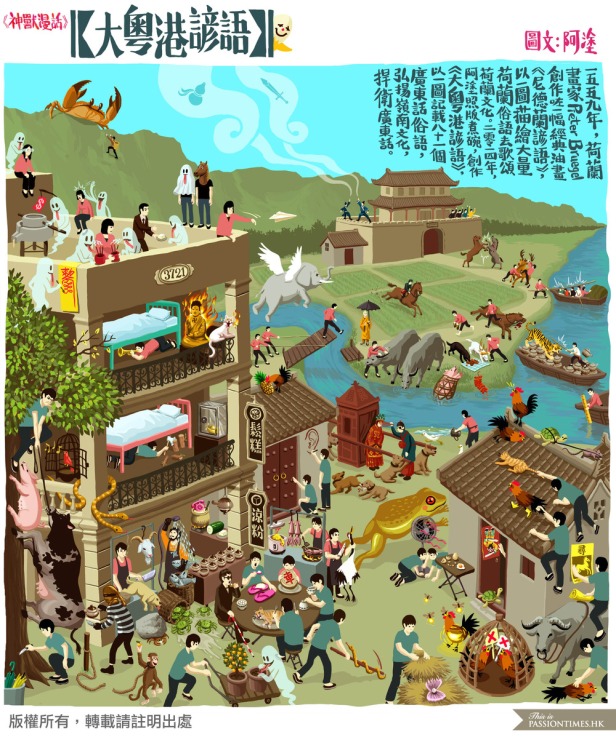
“The Great Canton and Hong Kong Proverbs”
In 1559, Dutch artist Pieter Bruegel created the oil painting “Netherlandish Proverbs” which illustrates many Dutch proverbs to praise the Dutch culture. In 2014, Ah To imitated the idea and created “Great Canton and Hong Kong proverbs” illustrating 81 Cantonese proverbs to propagate the Cantonese culture and defend Cantonese.
81 Cantonese Proverbs
(The 2 extra proverbs are the bonus given by the author. And audio clips only work on PC.)
| 1. | 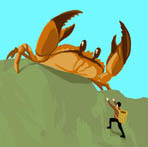 |
上山捉蟹 [séuhng sāan jūk háaih](To catch crabs on a hill) Harder than hard, almost impossible |
| 2. |  |
鬼揞眼 [gwái ám ngáahn](A ghost covers one’s eyes) 1. To fail to see something 2. To fail to find something 3. A freudian slip |
| 3. |  |
有錢使得鬼推磨 [yáuh chín sái dāk gwái tēui mòh](if you have money, you can make a ghost push a millstone) Everything is possible with money; money makes the world go round |
| 4. | 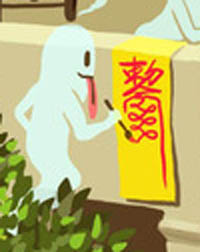 |
鬼畫符 [gwái waahk fùh](A ghost draws a talisman) Illegible scribble, poor handwriting |
| 5. | 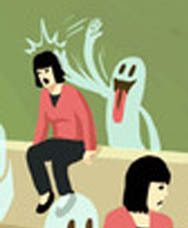 |
鬼拍後尾枕 [gwái paak hauh méih jám](A ghost slaps the back of one’s head) To let out a secret unknowingly |
| 6. |  |
多個香爐多隻鬼 [dō go hēung lòuh dō jek gwái](An extra incense burner would attract an extra ghost) Creating chance for someone to share your benefit. The tone of the proverb indicates a foolish act to invite losses.) |
| 7. | 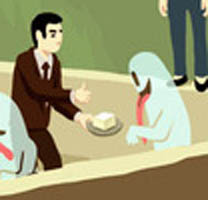 |
呃鬼食豆腐 [ngāak gwái sihk dauh fuh](To trick a ghost into eating tofu) 1. To lure someone into a trap, to trick someone 2. Used to express scepticism or disbelief, “you’re kidding me!” |
| 8. | 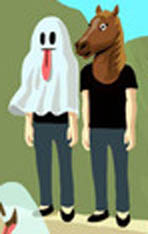 |
扮鬼扮馬 [baahn gwái baahn máah](To masquerade as a ghost and as a horse) To play a role to deceive somebody, to play a part to trick someone |
| 9. |  |
放飛機 [fong fēi gēi](To throw a paper aeroplane) To break a promise, to break a commitment; to fail to turn up for a date |
| 10. | 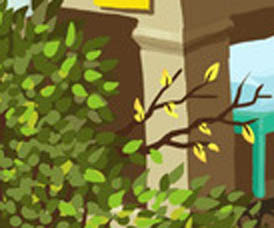 |
樹大有枯枝 [syuh daaih yáuh fū jī](A big tree has some dead branches) There are good and bad people in every group |
| 11. |  |
床下底吹喇叭 [chòhng hah dái chēui laa bāa](Blowing a horn under the bed, implying speaking at a kowtow position) In a begging / humble tone |
| 12. |  |
佛都有火 [faht dōu yáuh fó](Even the Buddha gets inflamed) To a degree that is intolerable, “that’s the limit!”. |
| 13. |  |
老貓燒鬚 [lòuh māau sīu sōu](An old cat burns its whiskers) An expert who makes a careless mistake in his/her own expertise. |
| 14. |  |
拉牛上樹 [lāai ngàuh séuhng syuh](To pull a cow up a tree) A vain attempt to do something |
| 15. |  |
豬乸會上樹 [jyū ná wúih séuhng syuh](Female pigs can climb trees) When pigs fly |
| 16. |  |
開籠雀 [hōi lùhng jéuk](A bird in an open cage) Someone who chatters all the time |
| 17. | 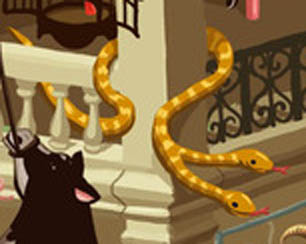 |
兩頭蛇 [lèuhng tàuh sèh](Two-headed snake) 1. someone who works for both sides in a deal 2. A servant of two masters |
| 18. |  |
床下底劈柴 [chòhng hah dái pek chàaih](Chopping wood under a bed. If someone is hiding under a bed but moves vigorously, very possibly he would bang his head against the wooden plate above him.) Epic fail; A method that doesn’t work |
| 19. |  |
玻璃夾萬 [bō lēi gaap maahn](A glass safe) Something that looks good but is not practical. |
| 20. |  |
上面蒸鬆糕,下面賣涼粉 [séuhng mihn jīng sūng gōu, hah mihn maaih lèuhng fán](Steaming sponge cake on top, selling cool powder below. Cool powder is glass jelly in English) It usually describes women who wear heavy clothing on top but barely cover their legs with mini skirts/short shorts during cold winter. |
| 21. | 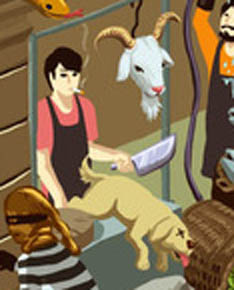 |
掛羊頭賣狗肉 [gwa yèuhng tàuh maaih gáu yuhk](Hang up a sheep’s head and sell dog meat) Try to palm off something. |
| 22. |  |
大石笮死蟹 [daaih sehk jaak séi háaih](A big stone crushes a crab) An unequal contest |
| 23. |  |
倒瀉籮蟹 [dóu sé lòh háaih](Spilled a basket of crabs) messy; troublesome |
| 24. | 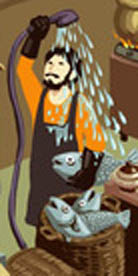 |
賣魚佬洗身 [maaih yùh lóu sái sān](A fishmonger washes his body – 冇晒腥氣 “no stinky smell”, which sounds like 冇晒聲氣 “no news”. ) To have yet to receive a positive response |
| 25. |  |
煲電話粥 [bōu dihn wá jūk](To boil telephone congee) To talk for hours on the phone. |
| 26. |  |
冬瓜豆腐 [dūng gwā dauh fuh](Winter melon and tofu) 1. An emergency, a crisis 2. An unfortunate event, especially death. |
| 27. |  |
倒吊沙煲 [dou diu sā bōu](A pot hanged upside down, implying that there is no rice left) Poverty, penniless |
| 28. | 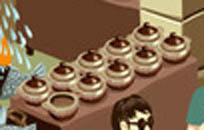 |
十個茶壺九個蓋 [sahp go chàh wú gáu go goi](ten tea pots and nine lids) demand out numbers supply; not enough |
| 29. |  |
刀仔鋸大樹 [dōu jái geu daaih syuh](Use a little knife to saw down a tree) Use little capital to make big profit |
| 30. |  |
賊佬試沙煲 [chaahk lóu si sā bōu](A thief is testing a pot. A burglar tests if there is any one home by breaking a pot.) Test the waters before doing bad things |
| 31. |  |
冇柄遮 [móuh beng jē](An umbrella with broken handle) To fight to the bitter end, to refuse to admit one is in the wrong |
| 32. |  |
甩繩馬騮 [lāt síng máah láu](Loose string monkey) 1. A very naughty child 2. Someone no longer under the control of their superior or guardian. |
| 33. |  |
馬騮執到桔 [máah láu jāp dóu gāt](A monkey got a tangerine) Someone looks very happy as if he has discovered treasure. |
| 34. |  |
運桔 [wahn gāt](To ship tangerines) To visit a shop or a person without any particular purpose, to be “just looking” in a shop; to waste someone’s time(*Gang members extort money by forcing shops to buy pots of tangerines)  |
| 35. |  |
鬼食泥 [gwái sihk nàih](a ghost eats mud) to slur your words |
| 36. | 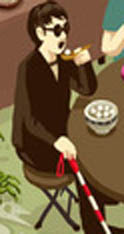 |
盲公食湯丸 [màahng gūng sihk tōng yún](A blind man eats glue pudding) Know the score |
| 37. | 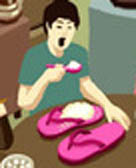 |
食拖鞋飯 [sihk tō háai faahn](To eat slippers rice) Used to describe a man who is supported by a woman, i.e. he can keep his slippers on, because he doesn’t have to work; a man who sponges off a woman |
| 38. |  |
食人隻車 [sihk yàhn jek gēui](To have eaten someone’s cart) To exploit or expropriate the belongings of others (a reference to the rules of Chinese chess) |
| 39. |  |
食碗面反碗底 [sihk wún mín fáan wún dái](To eat from a bowl and then turn it over) Go back upon somebody. Play somebody false. Betray a friend. |
| 40. |  |
食死貓 [sihk séi māau](to eat a dead cat) 1. To take the blame for something one has not done 2. To be a scapegoat, to “carry the can” |
| 41. |  |
放葫蘆 [fong wùh lóu](To throw a gourd) Self-boasting, bragging |
| 42. |  |
放飛劍 [fong fēi gim](To throw a flying sword) To spit |
| 43. |  |
企喺城樓睇馬打交 [kéih hái sìhng mùhn tái dá gāau](To watch a horse fight from the top of a fort) Observing from the sidelines |
| 44. |  |
飛象過河 [fēi jeuhng gwo hòh](An elephant flies across the river) 1. To break a rule 2. To reach across the table for food (a reference to the rules of Chinese chess) |
| 45. |  |
事急馬行田 [sih gāp máah hàahng tìhn](In a crisis, a horse can move in the field) To be flexible, to adapt to circumstances in an emergency (a reference to the rules of Chinese chess). |
| 46. |  |
過橋抽板 [gwo kíuh chāu báan](To pull up the planks after crossing the bridge) To betray one’s friends once the crisis is over, to abandon one’s friends once one is safe |
| 47. |  |
和尚擔遮 [wòh séung dāam jē](A monk holding an umbrella – 無髮無天 “no hair no sky” , which sounds like 無法無天 “no law no heaven”) No respect for law and order; unruly |
| 48. | 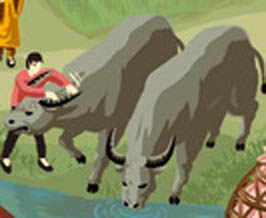 |
牛唔飲水唔撳得牛頭低 [ngàuh m4 yám séui m4 gahm dāk ngàuh tàuh dāi](If a cow doesn’t want to drink, you can’t force its head down) If someone is unwilling to do something, it is not possible to force them; you can lead a horse to water but you can’t make it drink. |
| 49. |  |
冇鞋挽屐走 [móuh hàaih wáan kehk jáu](When there are no shoes, grab the clogs and run) To withdraw hurriedly from an awkward situation |
| 50. |  |
馬死落地行 [máh séi lohk deih hàahng](when one’s horse dies, one has to walk) To rely on oneself, to have to get oneself through a difficulty without help. |
| 51. |  |
捉到鹿唔識脫角 [jūk dóu lúk m4 sīk tyut gok](Got hold of the deer but can’t get the horn) To be unable to make best use of an opportunity. |
| 52. |  |
一竹篙打一船人 [yāt jūk gōu dá yāt syùhn yàhn](Hitting everyone on a boat with a punt pole) To overgeneralise in assigning blame, e.g. to blame a whole group of people for one person’s mistake. Get tarred with the same brush |
| 53. |  |
缸瓦船打老虎 [gōng ngáh syùhn dá lóuh fú](Hitting a tiger inside a boat full of potteries) To risk everything on one bet; to gamble everything on one plan |
| 54. |  |
船頭尺 [syùhn tàuh chek](Plumb line on a ship) Someone who is always asking others for money (since 度水 dohk séui can mean either “to borrow money” or “to measure water”). |
| 55. | 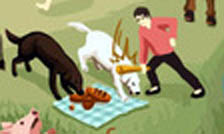 |
黑狗得食白狗當災[hāk gáu dāk sihk, baahk gáu dōng jōi](The black dog gets the food, the white dog gets the punishment) Somebody benefits by their wrongdoing, while another person gets the blame. |
| 56. |  |
豬籠入水 [jyū lùhng yahp séui](Water enters a pig basket) To have many different ways to make money, to have money coming from many different enterprises or sources. |
| 57. |  |
濕水炮仗 [sāp séui paau jéung](A damp firecracker) 1. Useless 2. Someone with a calm temperament, who doesn’t lose their temper |
| 58. | 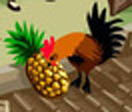 |
菠羅雞 [bō lòh gāi](Pineapple chicken) Someone who takes advantage of other people; an exploiter(*Pineapple chicken is the mascot of the Pala Temple in Canton, which sounds like pineapple temple in Cantonese. The mascot is made by gluing feathers on cardboard. In Cantonese, “glue” can also mean “sponging off one’s relatives or friends”. As the whole chicken is made by gluing, it becomes a symbol of someone who loves to “glue”, sponging off people.) 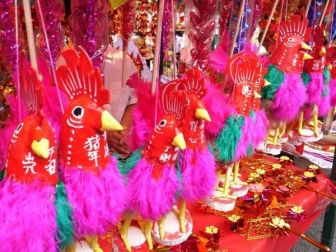 |
| 59. |  |
單眼佬睇老婆 [dāan ngáahn lóu tái lòuh pòh](One-eyed man looks at his wife) Too few/simple/obvious that one can see/understand everything in a “second”. |
| 60 |  |
狗仔抬轎 [gáu jái tòih kìuh](Puppies lifting /carrying a sedan chair – 不識抬舉 not knowing how to lift/carry things) Fail to appreciate others’ favours / flattering |
| 61. |  |
畫隻耳上牆 [waahk jek yìh jái séuhng chéung](Draw an ear on the wall) Words treated as unimportant, advice that is ignored |
| 62. |  |
摸門釘 [mó mùhn dēng](To scrape the door nails) To go to visit someone but not find them at home, to arrange a meeting with someone but not to find them. |
| 63. |  |
狗咬狗骨 [gáu ngáauh gáu gwāt](A dog bites another dog’s bones) Fighting among members of the same group |
| 64. |  |
死雞撐飯蓋 [séi gāi chaang faahn goi](Using a dead chicken to push back the cooking-pot lid) To fight to the bitter end, to refuse to admit one is in the wrong |
| 65. | 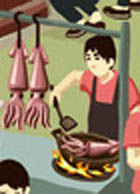 |
炒魷魚 [cháau yáu yú](To stir-fry squid) To dismiss an employee |
| 66. |  |
劏白鶴 [tōng baahk hohk/hók](To slaughter a white crane) To vomit, to throw up |
| 67. |  |
風扇底傾偈 [fūng sin dái kīng gái](Talking under a fan – 風涼話 a chilling talk ) Saying something rude upon others’ mistakes or misfortune, inconsiderate to others’ feeling) |
| 68. | 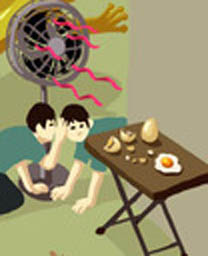 |
風吹雞蛋殼 [fūng chēui gāi dáan hok](Wind breaks an eggshell) Don’t worry about losing money. Be at ease with less fortune. |
| 69. |  |
打蛇隨棍上 [dá sèh chèuih gwan séuhng](To hit a snake and it crawls up the stick) To exploit a situation to one’s advantage, to ask for something or something extra by seizing a particular opportunity. |
| 70. |  |
禾稈冚珍珠 [wóh gón kám jān jyū](Rice stalks covering pearls) To pretend to be poor, to hide one’s true wealth (e.g. residents of public housing estates who are too wealthy to qualify for public housing) |
| 71. |  |
雞食放光蟲 [gāi sihk fong gwōng chúng](A chicken eats fireflies) To know in one’s heart, to fully understand, to not need to think further (As the chicken eats fireflies, its belly lights up) |
| 72. |  |
冇掩雞籠 [móuh yím gāi lùhng](A doorless chicken coop) A place where you can come and go as you wish. |
| 73. |  |
籠裏雞作反 [lùhng léuih gāi jok fáan](The chickens are fighting inside the coop) Dissent withing an organisation, an internal rift, factional fighting; infighting |
| 74. |  |
一雞死一雞鳴 [yāt gāi séi yāt gāi mìhng](One chicken dies, one chicken crows) When one person leaves a business or an occupation, another will take it up. |
| 75. |  |
老鼠拉龜 [lòuh syú lāai gwāi](A mouse pulls a turtle) At one’s wits’ end |
| 76. |  |
扯貓尾 [ché māau mèih](To pull a cat’s tail) Two people supporting each other’s stories in order to avoid a problem; to lie one’s way out of a problem. |
| 77. |  |
捉黃腳雞 [jūk wòhng geuk gāi](To catch a yellow-legged chicken) To catch someone having illicit sex; to arrange a trap or “set up” in which someone is blackmailed after being lured into having sex, to set a “honey trap”. |
| 78. |  |
貼錯門神 [tip cho mùhn sàhn](To paste up the door gods wrongly) To become hostile, to turn aggressive and nasty (since the door gods are normally pasted up so that they face each other, put if put up wrongly they face away from each other).
|
| 79. | 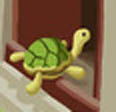 |
龜過門檻 [gwāi gwo mùhn láahm](A tortoise passing a sill, implying someone who can’t get on or get off) Unable to solve a problem or escape from it. A stalemate. |
| 80. | 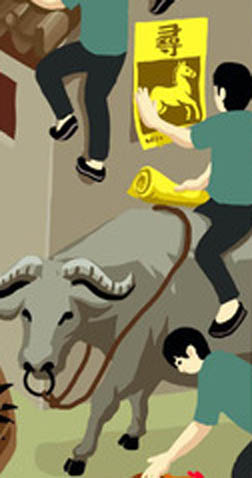 |
騎牛搵馬 [kèh ngáuh wán máh](To ride an ox looking for a horse) To be working one job but looking out for a better one |
| 81. |  |
執死雞 [jāp séi gāi](To pick up a dead chicken) 1. To take something which someone else has lost or thrown away 2. To take advantage of a situation 3. To start off a relationship with someone who has been rejected by their former lover 4. To get the benefit of someone else’s hard work 5. To score an easy goal after a shot has been blocked by the goal keeper. |
| 82. |  |
水過鴨背 [séui gwo ngaap bui](Water off a duck’s back) To make no impression on (the memory), to forget (a lesson); like water off a duck’s back |
| 83. |  |
咁大隻蛤乸隨街跳 [gam daaih jek gap lá chèuih gāai tiu](such a big frog hopping around the street) too good to be true |
The poster is now available at Passion Times, click here.


Waiting for the complete job! Thanks
Good job mate!
會唔會印出黎賣嫁?
咁你要問作者阿塗先得。我只係用佢嘅圖嚟介紹廣東話成語。你睇我個blog叫做Cantonese Resources,係提供廣東話資源嘅地方。
really good idea! Support!!
上面蒸鬆糕,下面賣涼粉
下面有d解釋睇唔到>.<
你話下面嗰啲空格? 我未寫晒… 我要喺我自己嗰個粵英文詞典file 搵,如果搵唔倒,要自己寫。
marvelous!! THANK YOU SO MUCH i can share w/ my ghost friends!! 😀
仲有
食拖鞋飯,食咗人隻車,豉椒炒魷, 食碗底反碗面,食死貓,打蛇隨棍上,禾稈冚珍珠,執死雞,貼錯門神,騎牛搵馬, 扯貓尾...
仲有好多,真的超好笑!
I think 鬼拍後尾枕 is better translated as “freudian slip”; and 鬼揞眼 as “to make a mistake so obvious that should not have made”
中有三七二十一,打
Reblogged this on joyous0507's Blog and commented:
值得看看。。。。。心機之作!!
三七二十一,打虎頭,一雞死一雞鳴,風吹雞蛋殼,牛唔飲水又點禁得牛頭低、狗咬狗骨,屎急馬行田
事急馬行田,老鼠拉龜,黑狗偷食白狗當災,一竹篙打一船人
死鸡撑饭盖,激死老豆揾山拜,咸鱼翻生,还有日本邮船,非洲和尚等算不算?
士急馬行田, 放飛劍 (?), 十個煲九個蓋, 籠裡雞作反, 一竹篙打一船人
Hahahaha…thanks for the work!! 😉
I also spotted 菠蘿雞, 死雞撐飯蓋, 捉到鹿唔識脫角, 騎牛搵馬, 老鼠拉龜, 馬死落地行, 和尚擔遮, 事急馬行田, 雞食放光蟲, 一雞死一雞鳴, 浸豬籠, 牛唔飲水唔_得牛頭低, 狗咬狗骨, 食人隻車, 食碗面反碗底, 冇鞋挽_走, 濕水炮仗, 咁大隻蛤_隨街跳…
(sorry I don’t know all the words lol)
also 多個香爐多隻鬼…
Is the jumping frog or toad 邊有咁大隻蛤乸隨街跳? Either way this is awesome!
以下可能係答案:
上山捉蟹 (難)
鬼掩眼
鬼拍後尾枕
有錢駛得鬼推磨
多個香爐多隻鬼
鬼畫符
呃鬼食豆腐
扮鬼扮馬
放飛機
三七二十一
樹大有枯枝
拉牛上樹
斷柄遮 (無揸拿)
豬乸會上樹
開籠雀
兩頭蛇
床下底劈柴 (撞板)
床下底吹喇叭 (低聲下氣)
佛都有火
老貓燒鬚
上面蒸鬆糕,下面賣涼粉
菠蘿雞 (一尾靠黐)
??夾萬 —– 睇得唔係好清楚,唔識答
煲電話粥
冬瓜豆腐
倒吊沙煲 (窮到粒米都無)
賣魚佬洗身 (無晒”腥”聲氣)
倒瀉籮蟹
掛羊頭賣狗肉
大石砸死蟹
賊佬試沙煲 (試下先)
刀仔鋸大樹
甩繩馬騮
運吉
鬼食泥
食死貓
食碗面反碗底
食咗人哋隻車
食拖鞋飯
盲公食湯丸 (心中有數)
十個沙煲九個蓋
死雞撐飯蓋
炒魷魚
劏白鶴
打蛇槌棍上
禾稈冚珍珠
雞食放光蟲 (心知肚明)
籠裡雞作反
騎牛搵馬
執死雞
烏龜過門檻 (等看此一番—睇你點死)
貼錯門神
風吹雞蛋殼 (財散人安樂)
咁大隻蛤乸隨街跳
老鼠拉龜 (無掟埋手)
一雞死一雞嗚
扯貓尾
捉黃腳雞
單眼佬睇老婆 (一眼睇晒)
狗仔坐轎 (不識抬舉)
養狗咬春袋
狗咬狗骨
大耳窿
摸門釘
水過鴨背 (無記性)
浸豬籠
濕水炮仗
牛唔飲水唔㩒得牛頭低
過橋抽板
和尚擔遮 (無”髮”法無天)
飛象過河
士急馬行田
黑狗得食白狗當災
缸瓦船打老虎 (盡地一煲)
無鞋挽屐走
馬死落地行
一竹篙打一船人
船頭尺 (踱水)
捉到鹿唔識脫角
企喺城牆睇馬打交 (事不關己睇熱鬧)
放飛劍
無鞋挽屐走,和尚擔遮-無法無天,濕水炮仗,十個煲九個蓋,咁大隻蛤乸隨街跳,貼錯門神
食死猫,隔牆有耳,摸門釘,鹿死誰手,度水,捉黄腳雞
度水! XDD
打蛇隨棍上,無yim雞籠
Reblogged this on Sweet & Sour.
《熱血時報》網站將於 2月26日 開始,逐步公布《大粵港諺語》答案:
http://www.passiontimes.hk/article/02-24-2014/8899
(阿塗每個月都有作品在《熱血時報》連載!)
嘩。第一次揾到廣府話研究网站。我好鍾意
awaiting yr translation very soon, and if you need help, feel free to ask for english meaning from me ! great sharing, loving it!
well done people, salute!
非常好,有誠意,尤其是广东话拼音,有别於“港式路名人名求其拼音“,如果真的有心教外国人讲广东话,不妨加入1~9声在每个拼音右边,因为这才是广东话的真髓。
This is really interesting, looking forward to the complete list!
1 鬼掩眼
2 有錢使得鬼推磨
3 鬼拍後尾枕
4 鬼畫符
5 多隻香爐多隻鬼
6 呃鬼食豆腐
7 扮鬼扮馬/鬼馬
8 放飛機
9 吾里(唔理)三七二十一
10 樹大有枯枝 (族大有乞兒)
11 床下底吹喇叭/D打(低聲下氣)
12 佛都有火
13 老貓燒鬚
14 飛象過河
15 過橋抽板
16 放飛劍(吐痰)
17放葫蘆(大隻廣,吹牛)
18 和尚擔遮(無法無天)
19 事急馬行田
20 牛唔飲水點撳得牛頭低
21 無鞋挽屐走
22 馬死落地行
23 一竹篙打一船人
24 缸瓦船打老虎(盡地一煲,在絕境下最後一博)
25 黑狗偷食白狗當災
26 船頭尺(度水=借錢)
27 浸豬籠/豬籠入水
28 濕水炮杖(點唔響,懶勁無料到)
29 捉到鹿都唔識脫角
30 拉牛上樹(強人所難,無符)
31 床下底劈柴(包撞板)
32 玻璃夾萬(襟睇唔襟用)
33 菠蘿雞(一味靠黐)
34 單眼佬娶老婆(一眼睇晒)
35 水過鴨背(點滴不留)
36 老鼠拉龜
37 一雞死一雞鳴
38 扯貓尾
39 捉黃腳雞
40 騎牛搵馬
41 貼錯門神
42 執死雞
43 籠裡雞作反
44無掩雞籠
45禾桿冚珍珠
46摸門釘
47 畫隻耳仔上牆(當耳邊風)
48隔牆有耳
49 狗咬狗骨
50 咁大隻蛤蜊隨街跳
51 風吹雞蛋殼(財散人安落)
52 烏龜過門檻(全看此一翻(番))
53 雞食放光蟲(心知肚明)
54 打蛇隨棍上
55 鬼食泥
56 運桔
57 甩繩馬騮
58馬騮執到桔(開心)
59(繩木)醒目
60 刀仔鋸大樹
61 賊佬試沙煲(試下先:賊佬在真正動手前,通常會先試探一下,故意製造一些噪音,看看屋內有沒有動靜,如有反應,立刻逃之夭夭,如沒反應,才放心入屋作案。)
62 (男人靠得住)豬毑會上樹
63 兩頭蛇
64 開籠雀
65 樓上蒸鬆糕樓下賣涼粉(形容衣著配搭怪異)
66 兩隻黃狗來抬轎(一抬抬到城隍廟)
67 掛羊頭賣狗肉
68劏死狗
69 大石砸死蟹
70 倒瀉蘿蟹
71 賣魚佬沖涼(冇曬(腥)聲氣)
72 煲電話粥
73 倒轉砂煲(冇飯開)
74 (有咩)冬瓜豆腐, (三長兩短)
75 十個砂煲九個蓋(捉襟見肘)
76 盲人食湯丸(心裡有數)
77 食死貓
78 食拖鞋飯(食軟飯,靠女人養)
79 食左隻車(收費狼死)
80 食碗面反碗底
81 死雞撐飯蓋
82 炒魷魚
83 劏白鶴(飲醉酒嘔吐)
84揸頸就命
85 上山捉蟹(難)
86 企喺城樓睇馬打交 (隔岸觀火)
87 風扇底下傾偈(講風涼話)
88 斷柄遮(無揸拿)
89同遮唔同柄(同人不同命)
你厉害!图说只有81个,但你有89个。佩服!
This is amazing! I just wish though that there was audio (Cantonese pronunciation) to accompany the explanation of meanings in the column on the right
禾秆盖珍珠,隔墙有耳,一杆打翻一船人,无鞋挽kek走,狗坐轿子,
Reblogged this on yanjianghk.
Excellent
湿水炮仗
咁大隻蛤乸隨街跳
Reblogged this on Dumpster.
很有意思的图画。身为海外华人(祖籍广东),有时候会很遗憾没学会写广东话,而只会说、听和看。图中大部分的谚语虽都听说过,但有些是看了这张图才明白的。感谢博主宣传广东话的努力,会继续关注这个部落格学习广东话的。。。^^
You can use this to listen to the cantonese words http://www.oddcast.com/home/demos/tts/tts_example.php?sitepal
風吹雞蛋殼
Kudos!! I am passing it along to all my Cantonese speaking friends!
Brilliant! Do you know how I can buy a copy of the print?
Reblogged this on Random Lifeholica.
Shouldn’t the guy who crosses the bridge be safe on the other side?
Reblogged this on The Irony Of Phrases and commented:
This is great post to read up about Chinese proverbs!
It has some of the most common Cantonese proverbs I’ve been hearing and also a lot which I have not come across.
Plus, it comes with this great big illustration which contains 81 proverbs in it.
Great read! 🙂
Wonderful… well done. You should add a WIKI page for this. There is a wiki page for the “Netherlandish Proverbs” drawing in the wikipedia:
http://en.wikipedia.org/wiki/Netherlandish_Proverbs
Reblogged this on Nomadic Permanence: Rob Packer's Blog and commented:
A Cantonese take on Brueghel’s painting of Netherlandish Proverbs. It’s absolutely wonderful – take a look.
oh God, how couldn’t I discover your page earlier 🙂 I love it!
This is absolutely amazing 🙂
Being a Cantonese speaker for all of my life, but I don’t think I know every single one of them!
實在太厲害!!!! 四個字=勁, 無得頂!!! 🙂 請繼續努力, 弘揚廣東話!!!
This is exceptionally brilliant!!
Reblogged this on North District Random – Hong Kong Random and commented:
Funny
用WhatsApp發咗哩幅圖比朋友,佢回番嚟,笑死我~~ 哇哈哈,好佩服作者阿塗比咁多歡樂,驚喜同回憶比我哋吖~~ 好有創意呀~~ Hee…hee… 🙂
Excellent!
狗咬狗骨
沉豬籠
禾桿冚珍珠
籠裡雞作反
我來自馬來西亞。我非常喜歡你的作品,請問可不可以拿來放大,放在我的茶室裡?
我本身家庭是講廣東話的。
According to the blog post above, Ah To (the artist) will consider releasing the picture as poster.
Grabbing the artwork and print it out yourself without the artist’s consent/permission is a disrespectful act. Please be patience, respect the artist’s hard work and support the artist 🙂
猪笼入水, ngak鬼吃豆腐,猪la会上树,拉牛上树,佛都有火,两头蛇,挂羊头卖狗肉,隔墙有耳,三七二十一,吃死猫,拖鞋饭,吃碗面翻碗底,大石笮死蟹, 倒斜囖蟹,十个褒九个盖,过桥抽板,飞象过河,鬼畫符,鬼马双星,鬼拍后尾枕,电话粥,刀仔剧大树,狗咬狗骨,死鸡撑饭盖,马死落地行,骑牛揾马,一luk棍打沉整条船,禾秆盖珍珠,吃左我只车,电话粥,湿水炮仗,mou鞋挽kek走, 多只香炉多只鬼,洗湿个头,thts all i got
冇掩鸡笼
應該是
1.鬼揜(ngam2)眼
2.大石砸(zaap3 )死蟹
吧?
3.有錢使(sai2)得鬼推磨; 作推使解吧?駕駛不合理。
Thanks for pointing them out! Learning a lot
Nicely done…but not all are proverbs — some are just idioms.
Love it!
How about ‘Bahn ju sic low fu’ which is pretend to be a pig but eating a tiger. Basically meaning ‘to pretend to be innocent but really not’.
This is a great list!
It would be great if you could give an example of when to use that phrase too
Upstairs steam ‘song go’, downstairs soak ‘leung fen’. Meaning you wear very warm clothes on top but hardly anything on the bottom.
Such a big ‘toad’ jumping all over the road. Means as if there’s such a good deal.
1.上面賣鬆糕, 下面賣涼粉.
2.禾稈冚珍珠
3.一竹桿打一船人
4.馬死落地行
5.黑狗偷食,白狗當災
6.一雞死一雞嗚
7.濕水炮仗
8.浸豬籠
9.飛象過河
10.過橋抽板
11.和尚擔遮
12.騎牛搵馬
13.貼錯門神
14.風吹雞蛋殼
15.老鼠拉龜
16.咁大隻蛤乸隨街跳
17.死雞撐飯蓋
18.牛唔飲水唔撳得牛頭低
19.兩頭蛇
20.老貓燒鬚
21.炒魷魚
22.摸門釘
23.運桔
24.鬼食泥
25.呃鬼食豆腐
26.狗咬狗骨
27.食碗面反碗底
28.倒瀉籮蟹
29.打蛇隨棍上
30.煲電話粥
31.冬瓜豆腐
32.大石砸死蟹
33.放飛機
34.風拍後尾枕
35.有錢便得鬼推磨
36.開籠雀
37.鬼畫符
38.豬乸會上樹
39.拉牛上樹
40.食左隻車
41.食拖鞋飯
42.食死貓
43.佛都有火
44.盲婚啞嫁
45.事急馬行田
46.執死雞
47.籠裡雞作反
48.扮鬼扮馬
49.鬼揞眼
50.刀他鋸大樹
51.甩繩馬騮
52.劏白鶴
53.掛羊頭賣狗肉
54.同遮唔同柄
55.無鞋挽屐走
56.隔牆有耳
57.十個煲九個蓋
58.樹大有枯枝
59.三七二十一
60.多個香爐多隻鬼
61.菠蘿雞
62.啞子吃黃蓮
63.咬耳仔
64.床下底吹喇叭
65.瓦缸船打老虎,盡地一煲
66.床下底劈柴
67.水過鴨背
68.扯貓尾
騎牛穩馬
飛象過河
鬼掩眼
有錢能使鬼推磨
鬼拍後尾枕
鬼畫符
放飛機
佛都有火
老貓燒鬚
開籠雀
豬乸上樹
刀仔据大樹
甩繩馬騮
大石砸死蟹
掛羊頭賣狗肉
煲電話粥
倒瀉籮蟹
冬瓜豆腐
運吉
鬼食泥
拖鞋飯
食人個車
食碗面反碗底
炒魷魚
死雞撐飯蓋
禾稈冚珍珠
打蛇隨棍上
扯貓尾
菠蘿雞
過橋抽板
沉豬籠
一竹竿打沉一船人
貼錯門神
執死雞
牛唔飲水唔撳得牛頭低
捉黃腳雞
摸門釘
Reblogged this on This Is Me and commented:
A very creative way to learn Cantonese.
lol 咋樓頂上全都是鬼啊?
Is the year correct (1559)? I Don’t think they have phones then and Hong Kong didn’t come into being till 1839……
Still great tho! 🙂
In 1559, Dutch artist Pieter Bruegel created the oil painting “Netherlandish Proverbs”
and 2014, HK painter did this.
Thank you very much for posting this! Very informative!
Reblogged this on . M e a n i n g f u l . C h a t t e r s . and commented:
This is the cutest illustration I’ve ever come across.
We should make something similar for every language! Great way to learn metaphors, idioms, and proverbs.
That’s is a very useful and funny materials to introduce our to the non-Chinese people.
騎牛搵馬 – also refers to finding a new relationship while being in one
The monkey one is also the Ku Fu move -> “Monkey steal peach!”
How about ‘lat sing ma Lau’ aka monkey with a broken rope?
Would love to be notify once this painting can be purchased.
還有: 雞食放光蟲
嫁出去的女,潑出去的水
Reblogged this on ಠ_ಠ LOLWUT and commented:
Haha I love this! I’m in the processing of going through these. Wouldn’t have been possible if not for the pronunciations since my Canto is bad 😦
A number of these are just phrases or sayings, not proverbs. Sayings describe situations, things or people, while proverbs conveys meaning or wisdom. Thus, I think it should be 81 phrases and proverbs.
But thanks for sharing!
absolutely love it!
Many of these could be found here…..
Many are not popular these days.
Brilliant drawing and must show how I’m impressed with the EXCELLENT translation!!! I am using this to teach my Taiwanese and American colleagues Cantonese~~~~~
What is the big crab on the hill?
Please do finish the table! I just went through these with my mom and had a great time 🙂
Reblogged this on A Pinch of Stardust and commented:
This is such a great find and so fascinating. I never realized how big ghosts are in our proverbs haha. I need to try some of these out on my parents in casual conversation and see if they’re surprised =D
can we get the book in market?
Beautiful and useful! Thank you for a much tedious work.
和尚擔遮 – 無法無天
regardless of the law and of natural morality
單眼佬娶老婆(一眼睇晒)
劏死牛
十個砂煲九個蓋
無掩雞籠
食左人隻車
狗咬狗骨
This is awesome. I think I will use this to teach my Canadian born kids. Thank you!
This is fantastic!!
excellent work!
上山捉蟹 (難上難)
烏龜爬門檻 (唔跌唔進)
禾秆盖珍珠
好厉害的画啊~ 劲啊
Saw a few more proverbs that i know, hope this helps:
Spil a basket of crabs.
Straw covering pearl.
Cross bridge, pull plank
賣魚佬沖涼/賣魚佬洗身 [無聲(腥)氣]
馬打架 [看蹄(題)]
企係城樓眼睇馬打 (事不關己)
多只香炉多只鬼
开笼雀
風扇底下傾偈
床底吹喇叭
床底砍柴
水過鴨背
黑狗偷食,白狗當災
單眼佬睇老婆:一眼睇曬
風吹雞蛋殼,財散人安落
打虎頭
烏龜過門檻
隔牆有耳
猴子偷桃
咁大隻蛤毑隨街跳
賣魚佬沖涼 – 冇腥氣
賊佬試沙煲
雞食放光蟲(心知肚明)
盲佬食湯圓(心中有數)
上山捉蟹 (難)
菠蘿雞(靠黐)
上面蒸鬆糕 下面賣涼粉
兩隻黃狗來抬轎
may i know….
Big crab on the mountain?
2 people fighting?
4 person wave hand?
2 horse fighting?
Gold inside the safe?
You are amazing! 睇到笑死人!超正!
缸瓦船打老虎
十個盎九個蓋
希望快啲有poster賣,可以成為好有代表性嘅香港手信!可以印成明信片,柸,柸墊,note book封面,枱墊……商機無限,阿塗加油!為港人增光!
Reblogged this on Meet Jiong.
I really want a poster version to give to my poor canto speaking family members and my kids one day! Please let me know if it gets released as a poster!
好欣賞你的態度,用有建設性又有創意有趣味去證明廣東話的價值👍👍👍👍👍
籠裡雞作反
狗咬狗骨
咁大隻“甲娜”隧街跳
好正呀, 如有產品一定支持!
吊高嚟賣
1 鬼掩眼
2 有錢使得鬼推磨
3 鬼拍後尾枕
4 鬼畫符
5 多隻香爐多隻鬼
6 呃鬼食豆腐
7 扮鬼扮馬
8 放飛機
9 三七二十一[唔理37定係21,總之攪掂佢就得]
10 樹大有枯枝,[族大有乞兒]
11 床下底吹喇叭(低聲下氣)
12 佛都有火
13 老貓燒鬚
14 飛象過河
15 過橋抽板
16 放飛劍(吐痰) +[左邊葫蘆,糊塗,即係作者,胡撚塗]
17 和尚擔遮(無法無天)
18 事急馬行田
19 牛唔飲水點撳得牛頭低
20 無鞋挽屐走
21 馬死落地行
22 一竹篙打一船人
23 缸瓦船打老虎(盡地一煲)
24 黑狗偷食白狗當災
25 船頭尺(度水)
26 浸豬籠/豬籠入水
27 濕水炮杖,[點極都唔響]
28 捉到鹿[都]唔識脫角
29 [您唱到]拉牛上樹[咁難聽]
30 床下底破柴(包撞板)
31 玻璃夾萬(襟睇唔襟用)
32 菠蘿雞(一味靠黐)
33 單眼佬娶老婆(一眼睇晒)
34 水過鴨背(點滴不留)[滴水不沾]
35 老鼠拉龜
36 一雞死一雞鳴
37 扯貓尾
38 捉黃腳雞(捉姦)
39 騎牛搵馬
40 貼錯門神
41 執死雞
42 籠裡雞作反+[無掩雞籠,自出自入]
43 禾桿冚珍珠
44 摸門釘
45 畫隻耳仔埋牆(唔聽流言)[隔牆有耳]
46 狗咬狗骨
47 咁大隻蛤蜊隨街跳
48 風吹雞蛋殼(財散人安落)
49 烏龜過門檻(看此一番)
50 雞食放光蟲(心知肚明)
51 打蛇隨棍上
52 鬼食泥
53 運桔
54 甩繩馬騮
55 刀仔鋸大樹
56 賊佬試沙煲
57 (男人靠得住)豬毑會上樹
58 兩頭蛇
59 開籠雀
60 樓上蒸鬆糕樓下賣涼粉
61 兩隻黃狗來抬轎(一抬抬到城隍廟)
62 掛羊頭賣狗肉
63 大石扎死蟹
64 倒瀉蘿蟹
65 賣魚佬沖涼(冇曬聲氣)
66 煲電話粥
67 倒轉砂煲(冇飯開)
68 冬瓜豆腐, [三長兩短]
69 十個砂煲九個蓋
70 盲人食湯丸(心裡有數)
71 食死貓
72 食拖鞋飯
73 食左你隻車
74 食碗面反碗底
75 死雞撐飯蓋
76 炒魷魚
77 劏白鶴(飲醉酒嘔吐)[揸頸就命]
78 上山捉蟹(難)
79 企喺城樓睇馬打交 [馬交friend,麻鳩煩]
80 風扇底下傾偈(講風涼話)[耳邊風]
81 斷柄遮(無揸拿)
Nice! This is probably the most accurate. 你确定玻璃夹万系咁嘎意思?
十只煲,九只蓋
The 粉 in 涼粉 mean noodle and not powder. And 涼 describes the herbal quality, not temperature. “Cool powder” is a very poor translation. 涼粉 is usually known as grass jelly.
With that said, this piece is awesome!
I simply want people to learn the literal meaning. I think I will add a bracket to tell people what “cool powder” is.
pass out green stool
非洲和尚
上山捉蟹 難上難
玻璃夾萬 有得睇冇得使
馬騮執到吉= 執到寶咁開心
過橋抽板: 如果可以改畫成一個人過左河之後, 抽起條橋等後面0的人過唔到, 會更加傳神
兩頭蛇:如果條蛇頭尾到係頭, 會更加傳神
btw, I like it very much 🙂
Love this so much! Wld be so interesting to understand how they were formulated ie background?
Will you make poster version? I will def buy 10!!
Great stuff!!!! If you can add audio, it will be perfect!
食得鹹魚抵得渴。
識少少,扮代表。
鬼唔知你阿媽係女人。
有姿勢,冇實際。
早知冇乞兒。
莫知前因莫羨人。
太正啦!多謝晒!好鍾意 !! 小小建議,呢D都好啜核: 扮豬食老虎,老鼠跌落天秤,狗口長不出象牙,雞手鴨腳,廁所點燈!
Just wonderful thanks!
Reblogged this on The best has yet to come and commented:
好鬼馬!
I know how to speak Cantonese, I am Cantonese but don’t know how to read. This is simply marvellous for me.
學嘢最緊要好玩。
好鬼死過引呀!!!!!!
李亞男老豆就最鐘意過橋抽板
how does
菠羅雞[bō lòh gāi]
(pineapple chicken
mean take advantage of someone, can someone explain these? 😦
豬乸會上樹 should be explained as “describing things that are impossible. e.g. if x can be y, a female pig can climb a tree!”
Reblogged this on tsangwinglun.
What about “bump into a ghost”
Thank you for sharing, It gave me and my friends hours of fun guessing.
Can add more:
5354 (miscellaneous)
Jor jor deng deng (blocking the way)
7 Lou 8 10 (very old and frail)
Sik Bo li dai (eat glass to grow up, scolding the person is standing in the way of your view)
The big frog: Dai Jek Tin Gai Cheu Gai Tiu
-> Too good to be true
玻璃夾萬,敢睇5敢用
Aka睇得5用得
1) 大石責死蟹2) 鬼黯眼3) 呃鬼食豆腐4) 有錢使得鬼推磨5) 鬼拍後尾枕6) 鬼畫符7) 多個香爐多隻鬼8) 扮鬼扮馬9) 放飛機10) 唔理三七廿一11) 床下底吹喇叭12) 佛都有火13) 老貓燒鬚14) 床下底破柴15) 兩頭蛇16) 開籠雀17) 拉牛上樹16) 乜乜靠得住,豬乸會上樹17) 刀仔鋸大樹18) 同遮唔同冇柄19) 甩繩馬騮20) 上面蒸鬆糕,下面賣涼粉21) 倒吊沙煲 22) 冬瓜豆腐23) 煲電話粥24) 賣魚佬洗身25) 十個煲九個蓋26) 掛羊頭賣狗肉27) 大石責死蟹28) 倒瀉籮蟹29) 賊佬試沙煲30) 運桔31) 鬼食泥32) 打蛇隨棍上33) 食埋人隻車34) 食碗面反碗底35) 拖鞋飯36) 食死貓37) 波蘿雞38) 飛象過河39) 過橋抽板40) 死雞撐飯蓋41) 炒魷魚42) 劏白鶴43) 狗咬狗骨44) 咁大隻蛤乸隨街跳45) 雞食放光蟲46) 禾乾冚珍珠47) 執死雞48) 騎牛搵馬49) 扯貓尾50) 捉黃腳雞51) 一雞死一雞鳴52) 老鼠拉龜53) 貼錯門神54) 風扇底傾偈55) 風吹雞蛋殼56) 和尚擔遮57) 事急馬行田58) 牛唔飲水點得牛頭底59) 馬死落地行60) 冇鞋挽屐走61) 黑狗得食白狗當災62) 豬籠入水63) 濕水爆仗64) 水過鴨背65) 船頭尺66) 缸瓦船打老虎67) 一竹篙打一船人68) 樹大有桔枝69) 猴子偷桃70) 狗咬呂洞賓71) 玻璃夾萬72) 捉到鹿唔識脫角73) 籠裡雞作反74) 盲公食湯圓75) 上山捉蟹76) 單眼佬睇新娘77) 城樓上看馬打架78) 城楼上亮相79) 無掩雞籠 80) 烏龜過門檻81) 摸門釘
Amazing!!! I like it!!!!
火燒旗桿 – 長炭(嘆)
其實係咪 廣府”揭後語”,諺語應該係指金石良言?
I don’t know if it’s been mentioned already, but 炒魷魚 (frying squid) comes from how in the past, workers would live at their workplaces, sleeping on mats. When someone got fired, they’d roll up their mat and leave, like how the edges of a piece of squid roll up when you fry it.
Thank you so much for explaining this! I’ve always been curious what squids have to do with getting dismissed from work. 🙂
Thanks for posting this. I am from Malaysia and Canto is my native tongue. However i am not educated in Chinese. I have heard almost all of the proverbs listed during my childhood, most of which i hardly use n my daily conversation nowadays. I could not imagine how it will be with my child and grandchild(ren) in future. Hope that you could complete the table soon enough.
By the way for the proverb of “打蛇隨棍上[dá sèh chèuih gwan séuhng]” i don’t think the translation (to hit a snake and it crawls up the stick) is accurate. to my understanding it is literally (to hit a snake, any stick will do).
The translation that the illustrator provided here for “打蛇隨棍上[dá sèh chèuih gwan séuhng]” is absolutely correct. I am a Malaysian too but I did get a rather good foundation learning of the Chinese language (my grandparents were from GuangZhou). Traditionally a person shouldn’t attack a snake with a stick as the snake will take the chance to crawl up the stick (that’s what snakes are good at) and in turns attack the person. The correct “weapon” should be something that’s not hard.
I am a Hong Kong people,and 打蛇隨棍上 is as same as 得寸進尺(Give him an inch and he’ll take a yard) to my understanding……
i think it is not 盲人食湯丸. it should be 盲人吃雲吞. it means 心中有數
I’m particularly interested in the person cutting wood under the bed and the person blowing the trumpet under the bed. Captain?
Reblogged this on reginaloops.
How about yat san dou, mo bah lei – body full of knives, but none are sharp
“Yat san doh, mo ba lei” 一身刀無把利 – which means “Fully loaded with knives, but none is sharp” = ones know many skills, but none expertise.
劏白鶴 – Someone vomits, throws up when he is drunk. The drunk part is main thing.
Thanks for the illustration.
A bit explanation on the ones which are 歇後語 will be easier to understand.. E.g. 菠蘿雞──一味靠黐(pineapple chicken):someone who takes advantage of other people; an exploiter; 斷柄遮──無揸拿(broken handle umbrella): no certainty; 盲人食湯丸──心中有數. 雞食放光蟲──心知肚明, etc.
These are quite different from those which are not 歇後語.
1 鬼掩眼
2 有錢使得鬼推磨
3 鬼拍後尾枕
4 鬼畫符
5 多隻香爐多隻鬼
6 呃鬼食豆腐
7 扮鬼扮馬
8 放飛機
9 三七二十一[唔理37定係21,總之攪掂佢就得]
10 樹大有枯枝,[族大有乞兒]
11 床下底吹喇叭(低聲下氣)
12 佛都有火
13 老貓燒鬚
14 飛象過河
15 過橋抽板
16 放飛劍(吐痰) +[左邊葫蘆,糊塗,即係作者,胡撚塗]
17 和尚擔遮(無法無天)
18 事急馬行田
19 牛唔飲水點撳得牛頭低
20 無鞋挽屐走
21 馬死落地行
22 一竹篙打一船人
23 缸瓦船打老虎(盡地一煲)
24 黑狗偷食白狗當災
25 船頭尺(度水)
26 浸豬籠/豬籠入水
27 濕水炮杖,[點極都唔響]
28 捉到鹿[都]唔識脫角
29 [您唱到]拉牛上樹[咁難聽]
30 床下底破柴(包撞板)
31 玻璃夾萬(襟睇唔襟用)
32 菠蘿雞(一味靠黐)
33 單眼佬娶老婆(一眼睇晒)
34 水過鴨背(點滴不留)[滴水不沾]
35 老鼠拉龜
36 一雞死一雞鳴
37 扯貓尾
38 捉黃腳雞(捉姦)
39 騎牛搵馬
40 貼錯門神
41 執死雞
42 籠裡雞作反+[無掩雞籠,自出自入]
43 禾桿冚珍珠
44 摸門釘
45 畫隻耳仔埋牆(唔聽流言)[隔牆有耳]
46 狗咬狗骨
47 咁大隻蛤蜊隨街跳
48 風吹雞蛋殼(財散人安落)
49 烏龜過門檻(看此一番)
50 雞食放光蟲(心知肚明)
51 打蛇隨棍上
52 鬼食泥
53 運桔
54 甩繩馬騮
55 刀仔鋸大樹
56 賊佬試沙煲
57 (男人靠得住)豬毑會上樹
58 兩頭蛇
59 開籠雀
60 樓上蒸鬆糕樓下賣涼粉
61 兩隻黃狗來抬轎(一抬抬到城隍廟)
62 掛羊頭賣狗肉
63 大石扎死蟹
64 倒瀉蘿蟹
65 賣魚佬沖涼(冇曬聲氣)
66 煲電話粥
67 倒轉砂煲(冇飯開)
68 冬瓜豆腐, [三長兩短]
69 十個砂煲九個蓋
70 盲人食湯丸(心裡有數)
71 食死貓
72 食拖鞋飯
73 食左你隻車
74 食碗面反碗底
75 死雞撐飯蓋
76 炒魷魚
77 劏白鶴(飲醉酒嘔吐)[揸頸就命]
78 上山捉蟹(難)
79 企係城樓眼睇馬打 (事不關己)
80 風扇底下傾偈(講風涼話)[耳邊風]
81 斷柄遮(無揸拿)
82 馬騮執到吉 ( 開心)
83 打虎頭
84 無掩雞籠
Money, ghosts, superstitions & traditions – yes that’s the Cantonese.
Oh and theft!
Great job! 打蛇隨棍上 is not the same as 得寸進尺. The latter describes someone taking advantage of the situation and has a negative connotation. The former is said to encourage someone to take advantage of the situation. Personally, I think 盲人食湯圓 is the authentic expression but I can see that wanton also works. Is the illustration available to buy as a poster? I would love to have it.
is illustration available to download / buy
K M Low · February 27, 2014 – 11:45 am · Reply→
How about yat san dou, mo bah lei – body full of knives, but none are sharp
means….jack of all trades, master of none.
What?! Where’s “holland bank cheque”, “lighting lantern inside toilet”, “Benz brake”, “Macau friends”, “delay no more” and etc?!
畫嗰個勁,翻譯都好有心
Let’s see if this works: m̀h. I typed “m300” and ALT-x in Microsoft Word, and that made an “m” with a grave accent. Then I copied and pasted it here.
Other minor corrections I might suggest, though I’m not a native speaker:
“to pull up the plank after crossing the bridge” should be “gwo kìuh chāu báan”. (grave accent)
“old cat burns its whiskers” should be “lóuh māau sīu sōu”. (acute accent)
“two headed snake” should be “léuhng tàuh sèh”. (acute accent)
“loose string monkey” should be “lāt síng máah lāu”. (macron) [Technically, in standard Yale, it’s “máh”, but I actually like DCS Yale better, where “aa” never defaults to “a”.]
“to eat from a bowl and then turn it over” should be “sihk wún mihn fáan wún dái”. (h) [It’s interesting that you use the simplified character for “mihn”, like in China, where they eat face.]
“to pull a cat’s tail” should be “ché māau méih”. (acute accent)
“a mouse pulls a turtle” should be “lóuh syú lāai gwāi”. (acute accent)
加上’满天神佛’赞!’加油’!!
Oops. I guess the “m” with a grave accent doesn’t show up properly here.
正
Very interesting ! Thanks, 今星期日有空出來吃飯唱K嗎?
16.各施各法?!
Pedagogy is the science and art of education. The method and practice of teaching, especially as an academic subject or theoretical concept. An effectively pedodogy hugely rely on engaging audiences and initiate their learning throughout appropriate medium. This is an interesting example in exploring the concept of pedagogy. Simple and effective. Develop a set of play card please.
「運桔」唔係運氣差?
Not sure if someone has mentioned this already, but Regarding the one about “riding a cow to look for a horse” is not used only for looking for a job. Basically, it can mean that you take the lesser ideal or more commonly available option at the moment, but you are still looking out for the ideal one, e.g, dating an average girl while still seeking out your dream girl.
The man spraying water on his own head might be 水 jum 眼尾头。
Reblogged this on chungconscious and commented:
81 Chinese Cantonese proverbs in a single mural!
16:各施各法
31:玻璃夾萬一有得睇冇得駛
This is so awesome! I learned a lot of new ones! 🙂 I’ll be back in Hong Kong in April, so this is all very useful. =^_^=!
Awesome!
Would you be able to research / document how these proverbs came about? Origin of them?
I like this thing.
It is correct 打蛇隨棍上 is not the same as 得寸進尺. 打蛇隨棍上 means 蛇善爬樹, 棍的形狀就好像樹一樣, 你棍子往蛇那兒伸去打它, 一不小心它就很容易隨著棍子爬上來. 在現代口語中, 常用來形容一個人很會察言觀色, 在與人交往中很會順著別人的話語的漏洞或抓住某個機會, 就順藤摸瓜佔人便宜, 或趁機取得他自己的利益, 有點 “順勢” 的味道
Love this blog.
Suggested typing correction: “cool powder = GRASS jelly in English”, not “glass jelly”
年晚煎堆—————人有我有。
花心蘿蔔—————見一個愛一個。
年晚煎堆—————人有我有。
花心蘿蔔—————見一個愛一個。
冬前臘鴨—————隻扲隻﹔(點樣配點樣﹔什麼樣都有人要的意思)。
水瓜打狗—————唔見左一半。
落地契錢————–引死人。(very attractive)
濕水麵粉————–拂都拂唔開。
狗咬呂洞賓———–不知好人心。
墳場姑爺仔———–溝死人。
我来自马来西亚,自小有講粤语。原來依福画入面我大部份的谚语都有聽過啊。我覺得画得好有心思,我也非常喜歡依幅画。希望作者多多加油哦!Great work and I love it ! Thanks ^-^ Actually many of my friends like it too.. thanks for sharing ~
Interesting, but not sure if all these are really originated from Canton? Like “掛羊頭賣狗肉”, has been used in mainland and Taiwan for many years too.
Reblogged this on hello, my name is grace luk and commented:
Ah To has done a very good job illustrating 81 Cantonese proverbs (among them, some are 歇後語). It is very enjoyable to look at all the details of every single corner of the drawing. It is also very educational in reading the captions about the proverbs. Good work in the drawings and the translations.
There is one that’s easy to add: wearing the green hat. You all who know Cantonese knows what this means.
Great work in the drawings and the translations.
Reblogged this on Space for lasam and commented:
Reblog: CANTONESE PROVERBS IN ONE PICTURE
Have fun~
Kum tai jek kap na chui gai tiu
電燈謄—————–唔通氣。
出爐鐵—————–欠打。唔打唔得。
田雞過河————–各自各。
牛皮燈籠————-點極都唔明。
雞食放光蟲———一睇就明(知)。
阿蘭嫁阿瑞———-累鬥累。
陸運庭睇相———-唔衰囉來衰。
烏蠅樓馬尾———一拍兩散。
Love your work. Embedded Cantonese audio would make this pictures come alive.
偷鸡吾到,涉渣米。
拜神唔見雞 —— 嘮嘮叨叨,不是滋味。
Reblogged this on Berning Along and commented:
Just something I found really interesting to share
and that is an awesome illustration…
Here are two more with 歇後語 and a pun:
老公泼扇 — 妻涼
老婆擔遮 — 陰公
Here’s a couple forgotten ones.
Letting go of airplanes – stood up
Eating north west wind – waiting for nothing
This is perfectly delightful! Of course many are new to me, but at least I’ve learnt these new ones! What a wonderful “secret code” kinda painting.
Thanks, Matt!
There are only 64 explanations??
Many thanks to Ah To for creating this painting , which has given my friends, my friends’ friends , relatives, etc a lot of fun, learning and memory training.
Meanings of:
老公泼扇 — 妻涼(sorrowful)
老婆擔遮 — 陰公(pitiful)
打虎頭 — skim off the top (reporting on money matters)
非洲和尚 — 黑人僧 (despicable)
风扇和鸡蛋应该係风吹鸡蛋壳财散人安乐。墙上画耳仔係隔墙有耳?
仲有一个狗咬狗骨。
卖鱼佬洗湿咗个头。
Even the squid is hanged up-side-down, there is not even a drop of ink from it. Means a stupid person that cannot say or write something knowledgeable. 倒吊都冇滴墨汁
“an stupid / ignorant person”
Awesome! I’d definitely buy a poster of this…
I’d buy this as well, especially if it comes with a table of vignettes and their explanations!
OT (don’t know how to contact you): many thanks to the site author. I’ve created a basic android app based your dictionary. The data was embedded. It is available in Google Play: https://play.google.com/store/apps/details?id=org.hongkonger.hongkongeseEnglish
Dongh lei hai beangh mao (to treat one like a sick cat): to ignore someone
poor cats
都可以講:“我唔發火你(居然)當我係病貓!” 跟著的情境就是講這話的人要 “振夫剛,呀振夫剛” 了。
I found that 跌o左落地都要執返咋沙(even if you dropped something, you still need to pick up some sand) is not included! Meaning embarrassed but need face面子。
拾死雞,隔場有耳。。
鐵飯碗———-政府工。
楊柳樹———-兩頭擺。(有好處就走去那邊)
落雨擔遮——-死擋。(好老友)
瓜田籬下——-惹人懷疑。
八仙過河——-各施各法。
螳螂擋車——-不知量力。
非洲和尚——–黑(乞)人憎。
賣魚佬沖左涼——冇晒腥(聲)氣。
貓哭老鼠
觀音頭掃把脚
有頭髮邊個想做癩痢
色字頭上一把刀
擔返買水
四塊半
九牛一毛
行船爭解纜
和氣生財
人逢喜事精神爽
千揀萬揀揀着個爛燈盞
失匙夾萬
釣金龜
成龍快婿
神仙放屁
搭沉船
有靠山
執劑你嘆
藤條炆豬肉
講耶穌
口水多過茶
擒擒青
騰騰震
買大開細
開口中
烏鴉口
啋, 啋過你
屎忽鬼
屎橋
放水/開細/交水費
擺堆/開大
吔蕉啦(你)
慳啲啦
出嚟行
做盛行(從事哪個行業)
去飲, 請飲
嗰頭近
啲打佬
大酒店(殯儀館)
好嘅唔靈醜嘅靈
黑過墨豆
黑面
痾鎖鏈
炒蛋/漏煤氣(放屁)
開口夾着脷
打茄淪
光管腳
大騎樓/大包米 (乳房大的女性)
濕水雞仔
落湯雞
落狗屎
曬到隻狗
搵到天腳底
珍珠都無咁真
打爛沙盤抿都篤
入廠
廢柴
士擔
搭叮叮
過大海
斷片
著人舊鞋
老細
青豆仔
老蚌生珠
朱義盛
大蛇痾尿
流馬尿
流蚊飯
爆缸
好冧
做雞
雞蟲
馬欖
騎樓
撲水
易過借火
話都無咁易
小強
咪當我囉拔 / lulu
三腳貓功夫
流嘢
堅嘢
堅過石堅
堅定流
金撈
舉咗佢
裝假狗
孭鑊
吹水
睇水
隻揪
鬼見愁
鬼打歸
依牙鬆槓
開枱
呀吱呀咗
吔文吔武
報串
睥(注視)
隊冧(灌醉或殺死)
篤背脊
無掩雞籠
無大無細
包雲吞(包裹着鼻涕的紙巾)
姨媽到
嗱嗱聲
拍硬檔
一鑊熟
食大茶飯
魚蛋檔
姑娘(護士)
大頭綠衣
荷蘭水蓋
發水麵包
辛苦搵嚟志在食
橫財就手
開房/爆房/搞嘢
滐撻撻
鹹魚(屍體)
龜(警察)
鬼佬
菜(女友)
老笠
劈友
Hea
揼波鐘
老鼠拉龜
痾篤尿照下
盲頭烏蠅
百足咁多爪
煲老藕
捉黃腳雞
蛇王
扯旗
二世祖
乸脷
做鬼唔靈
蘿蔔頭
黐脷根
黐孖根
黐線
踎塔
搵食(工作)
篤波
遊埠
喉擒
鹹濕
瀨嘢
餵到埋口唔識食
地上執到寶,問天問地攞唔到
唔洗問阿貴
飛機場(胸部平坦的女性)
未夠秤
咩料
梳起唔嫁
做牛做馬
求神拜佛
入廟拜神入屋叫人
細路
攝灶罅
古老石山
肉彈(乳房豐滿)
做老襯
俾人搵老襯
襯你病攞你命
個肚打鼓
某人肚裏條蟲
四眼
金盆洗手
飲得杯落
老人院都唔收你
無你修
淡過師姑尿
唔執輸
執生
大龍鳳
唔信邪
閘住
唔老嚟
山草藥廅得就廅
行唔安坐唔落
難啃
啃咗佢
反轉豬肚就係屎
讀屎片
浸過咸水
鹹豬手
沙紙(學歷證書)
撻嘢
撻著(愛情萌芽)
賤過地底泥
爛泥扶唔上壁
扑嘢
孖葉(手銬)
執二灘
食鹽多過你食米
契弟
老點
昆(欺騙)
出貓
蘇州過後無艇搭
樹上隻雀都氹到落嚟
唔好講埋啲衰嘢
有幾可
屈得就屈
姓賴
阿茂整餅
飛砂走奶
鴛鴦(飲品)
臭格(監倉)
通櫃
贏(書)
咖喱雞(吻痕)
邪骨
一張票睇到笑
有屁就放
下巴輕輕
托大腳
殘廢餐
博大霧
跟人口水尾
無咁大個頭唔好帶咁大頂帽
揼骨
游乾水
飛上枝頭變鳳凰
白鴿眼
心頭高
口同鼻咬
打死狗講價
車大炮
河水不範井水
臨渴先嚟掘井
唔識人(忘恩負義)
濕水爆丈
襟兄弟
陀手lang腳
船頭驚鬼船尾驚賊
生人唔生膽
生人霸死地
生仔無屎忽
小心眼
躝屍訖路
頂你個肺塞你個胃
陰司紙
玉皇大帝都冇面畀
保你大
有怪莫怪細路仔唔識世界
唔該借歪(請人讓路,或到山邊小解前對附近鬼魂的溝通)
白炸(交警)
鬥雞眼
額頭鑿住
心口掛住個勇字
到喉唔到肺
行路打倒呑
上五寸下五寸
慈菇啶
白虎
百足(手術疤痕)
洗衫板(平胸)
手瓜起展
交際花
砂煲咁大個拳頭
人中長性慾強
洗腳唔抹腳
擘大個口得個窿
頭大無腦腦大裝草
著起龍袍唔似太子
劏豬櫈
燉冬菇
無情雞
肥雞餐
縮骨
鐸縮
波牛
收皮
食詐糊
詐諦
被噴一面屁
實牙實齒
牙齒當金洗
盆滿缽滿
大口氣
隻手遮天
天跌落嚟當被冚
有咩浪未見過
觀音兵
食粥食飯睇你喇
睇餸食飯
唱錢
掂過碌蔗
金銀膶
你條粉腸
釘蓋
剝光豬
生蛇
大嚿衰
劈炮
做生不如做熟
春袋
老虎蟹
老虎都打死幾隻
扮豬食老虎
無/食咗隻豬
牛精
死牛一邊頸
攣弓蝦米
乞兒兜搶飯食
無眼睇
有眼無珠
死唔眼閉
妹仔大過主人婆
打牙骹
加鹽加醋
呷醋
倒米
倒奶
溝女/仔
飛仔/女
無尾飛陀
貪字得個貧
阿塗張圖有冇高質版?
扮晒蟹
曬命
偷雞
Love it. Thank you.
多个香炉多只鬼
There is another little guide out there called The Little Red Swear Book: https://www.facebook.com/TheLittleRedSwearBook?fref=ts
I love it and really enjoy it. Thank you so much for your hard work. This is a great tool to teach my ABC kids some real cantonese.
I would love to obtain a print
糖黐豆
水溝油
耍太極
耍北派
馬後炮
神仙過海
楚河漢界
貓哭老鼠
梳起新娘
雷大雨小
魚夫搵食
泥菩薩過河
啞仔食黃蓮
老鼠跌落天秤
Has there been any update as to whether a high res version or prints will be available?
I’ve recently asked the author about it. He said he’s considering making it into a poster…
Did he mention where he would update if he did offer it as a poster? I would love to get it as a birthday gift for someone. Thanks!
Hello, did he make it as poster then? I love it and I’d love to have it 🙂 Thank you!!
great thing to translate this for non-Cantonese speakers!
When do you think you’ll able to complete the translation? I’m so looking forward to it
thanks for the hard work!
I’ve gotten helps from others. Now, the translation is done.
Awesome. Thanks a lot!
Well done! I am a Bruneian Cantonese. Please allow me to put up the link in my blog.
sure
賣燒臘
皇帝女
大蝦籠
食三六
亞茂整餅
豉油撈飯
除褲放屁
賣咸鴨旦
亞超著褲
開口夾著俐
水鬼升城隍
雞毛當領箭
黃皮樹了哥
光棍佬教仔
擔屎唔偷食
食屎食到豆
使銅錢夾大聲
女人心海底針
上得床想衿被
大家研究﹔研究下﹔可以嗎﹗﹗
運桔 —–跟‘混吉’同音。搞搞震﹔無幫襯的意思。
畫隻耳上牆 —–聽唔入耳。
龜過門檻 —-唔上唔落。
老鼠拉龜 —-無從入手。
風吹雞蛋殼 ——財散人安樂。
單眼佬睇老婆 ——一眼睇晒。
企向城樓睇馬打交 ——-事不關己﹔幸災樂禍。
大石笮死蟹 ——–以高位﹔大權欺負﹐欺壓下屬的人。
豬_會上樹 ——–信你就奇﹔難以相信。
玻璃夾萬 (銀行經理)——–睇得唔使得。
This is a very interesting picture. However, it should be re-titled as Cantonese IDIOMS in One Picture.
An idiom is a phrase that has a meaning of its own that cannot be understood from the meanings of its individual words. (Merriam Webster Learner’s Dictionary)
A proverb is a short popular saying that gives advice about how people should behave or that expresses a belief that is generally thought to be true. (Merriam Webster Learner’s Dictionary)
I enjoy guessing the idioms very much. Great job.
擔旛(用竹竿等挑起来直着挂的长条形旗子)買水
乘(坐,駕馭)龍快婿
Simple modification on #8 : Add the number 5 on the ghost, 6 on the horse, which makes “鬼五馬六”
Reblogged this on and commented:
正!
Reblogged this on Living in the Dragon's Belly.
Excellent confident synthetic attention for details and
can anticipate complications before they will take place.
跌倒拿番一扎沙。吾知写得对冇。
Reblogged this on random stuff around and between and commented:
amazing / so smart / fun
Amazing. As a fluent Cantonese speaker, I tend to get confused and embarrassed when my someone throws those proverbs or idioms in a conversation..
Reblogged this on Eye School and commented:
I understand some of these!
Hi, I’m the CEO & Founder of a travel social network (soon to be web/mobile app) – http://www.foftravel.com. However some friends of mine just started a Chinese language learning platform at:
http://www.liveitchina.com
I promised I would help them out as I think it’s a good idea. As your site is dedicated to helping people learn Cantonese, I was wondering what opportunities there were to work with you and help more people know about Live It China (based here in HK but plans to expand into greater China later on this year). What’s the best way to contact you?
Thanks!
– Krissa
How about this one? “Taking off one’s pants to fart.” Or “Chui fu fong pei.” Meaning: Doing something totally unnecessary.
Really Good the last time I visited this site early in the year, now it gets even BETTER! Thanks!
This is AWESOME. Is there anyway I can buy a good quality copy of the image to put on print? I want it on my wall!
Reblogged this on All Things Computer Science.
無得頂!
This is terrific for Cantonese (in Hong Kong) as a foreign language; entertainment for old Hongkers. Newer generations will probably never use them. What a pity!!!
I had a few more but cannot share with you due to inability to write Chinese on my computer.
Keep it up. God bless!
Reblogged this on plynxox and commented:
amazing!!! some I need to ask parents for details……
Great work, Ah To!
(But consider that Cantonese has 6 tones, not 4. So perhaps you might add the numerals 1 – 6 after each romanisation to give the proper pronunciation?)
e.g. 上山捉蟹 seung3 saan1 jok1 haai3
圖文並茂,讚!!!!
收起慢慢嘆
For someone who cannot read Chinese the Cantonese audio has been immensely helpful! Have learnt several plus the ones I already know from my parents.
Impressive … super.
I’m so glad I found this little gem. I will begin studying/learning 2 proverbs each week. T
hank you, thank you.
电脑打唔到广东字体。。今日看了还是有很多港戏的回忆,应该全从戏里听到学到。但右上角天空太空了,应多加条‘飞龙在天’ 或 ‘雨过天晴’ 之类。
No matter how good the 2017 Yankees are, Aroldis Chapman will break the 40 mark this season.
While the A’s may be looking towards a youth movement, signing Davis does not impede progress.
He’s had his hands full in defending Curry, he looked gassed on offense and wasn’t nearly as aggressive as James.
t is a step in the right direction if we are to believe this is the final rebuild we will have to face for a long time.
n combination with the returning Jimmy Gopperth, who will compensate for the loss of the injured Danny Cipriani.
Can someone tell me what’s the meaning of the idiom ” bao won ton” ( wrapped wonton) other than the edible ones!
包雲吞 – literally “wrap a wonton”. In Cantonese it means blowing one’s nose into a napkin.
I have noticed you don’t monetize your page, don’t waste your traffic, you can earn extra bucks every month.
You can use the best adsense alternative for any type of website (they approve all websites),
for more details simply search in gooogle: boorfe’s tips monetize your website
Love this!!!
How can I purchase a copy of this art piece?
Love this!!!
How can I purchase a copy of this art piece?
Thanks